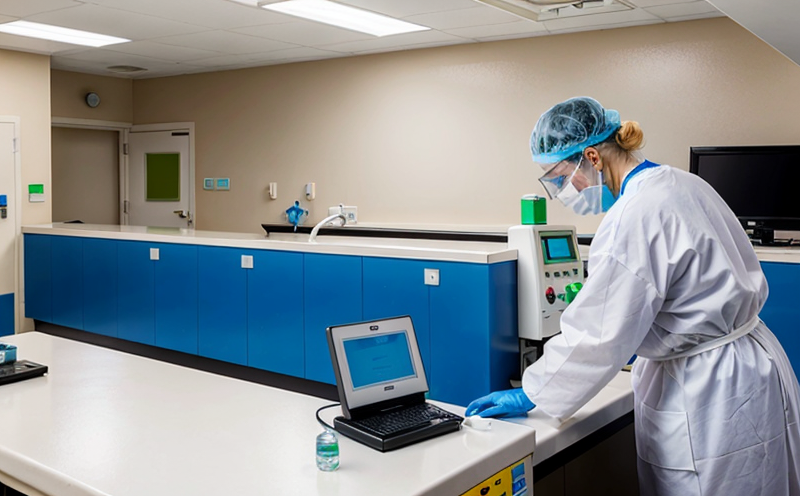Antimicrobial Coating Effectiveness Testing on High-Touch Surfaces
The proliferation of healthcare-associated infections (HAIs) has underscored the critical need for effective infection control measures. Antimicrobial coatings, applied to high-touch surfaces within hospitals and other healthcare settings, represent a promising strategy to mitigate microbial contamination and subsequent infections. Eurolab’s expertise in this field allows us to provide comprehensive testing services that evaluate the efficacy of these coatings under real-world conditions.
Our testing protocol involves replicating the actual environmental conditions found in hospital environments, including temperature, humidity, and exposure to various pathogens. This approach ensures that the results obtained are relevant and actionable for healthcare providers. The high-touch surfaces most commonly tested include bed rails, door handles, medical equipment, and countertops.
The testing process begins with the application of a standardized microbial challenge to the surface. Bacterial strains such as Staphylococcus aureus, Pseudomonas aeruginosa, and E. coli are used, which are among the most prevalent pathogens in healthcare settings. These organisms are inoculated onto the coated surface, and their survival rates are monitored over time.
The effectiveness of the antimicrobial coating is evaluated using a combination of quantitative and qualitative methods. Quantitative measures include colony-forming unit (CFU) counts before and after exposure to the microbial challenge. Qualitative assessments involve visual observations and microscopic analysis to determine the extent of microbial inactivation. Our laboratory adheres to international standards such as ISO 18173, ensuring that our testing methodologies are rigorous and reliable.
The results of these tests provide valuable insights into the long-term efficacy of antimicrobial coatings. This information is crucial for healthcare facilities looking to implement evidence-based infection control strategies. By understanding how different environmental factors impact the performance of the coating, hospitals can make informed decisions about which products to incorporate into their cleaning and maintenance protocols.
Our testing services also extend beyond basic efficacy assessments. We offer additional analyses that help clients understand the durability and wear resistance of the coatings under real-world conditions. This includes accelerated aging tests to simulate long-term exposure to environmental stressors such as sunlight, humidity, and abrasion.
In conclusion, Eurolab’s Antimicrobial Coating Effectiveness Testing on High-Touch Surfaces is designed to provide healthcare providers with robust data that can inform their infection control strategies. Our expertise in this area ensures that the testing process is both comprehensive and reliable, delivering results that are actionable and impactful.
Eurolab Advantages
- State-of-the-Art Facilities: Eurolab boasts advanced laboratories equipped with the latest instrumentation for microbiological testing, ensuring accurate and reliable results.
- Comprehensive Testing Protocols: Our protocols adhere to international standards such as ISO 18173, guaranteeing that our tests are both rigorous and relevant.
- Expertise in Healthcare Settings: Eurolab’s team of microbiologists and engineers has extensive experience in testing antimicrobial coatings for healthcare applications.
- Data Integrity: We maintain a strict chain of custody to ensure the integrity of our test samples throughout the entire testing process.
Why Choose This Test
- Enhanced Infection Control: By ensuring that antimicrobial coatings are effective, hospitals can significantly reduce the incidence of healthcare-associated infections.
- Evidence-Based Decision Making: Our testing provides data-driven insights into the performance of different coating products, enabling facilities to make informed decisions about procurement and implementation.
- Regulatory Compliance: Eurolab’s adherence to international standards ensures that our testing aligns with regulatory requirements, facilitating compliance for clients.
- Long-Term Durability: Our accelerated aging tests provide valuable information on the durability of coatings under real-world conditions.
Environmental and Sustainability Contributions
The use of antimicrobial coatings not only enhances infection control but also contributes positively to environmental sustainability. By reducing the need for frequent cleaning and disinfection, these coatings help minimize the use of harsh chemicals and reduce waste generation.
Moreover, effective antimicrobial coatings can lead to reduced energy consumption associated with additional cleaning efforts. This is particularly important in healthcare settings where energy efficiency is a key consideration. Our testing services assist facilities in selecting products that not only meet their hygiene needs but also contribute to sustainable practices.
The results of our tests are essential for healthcare providers to justify the use of these coatings from an economic and environmental perspective. By demonstrating the long-term benefits, we help clients achieve a balance between infection control and sustainability goals.





